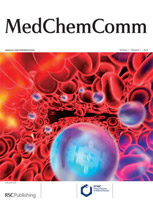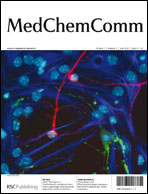September 27th 2010 at the Chemistry Centre, Burlington House, London UK
Join in this discussion of the critical issues that underpin the future of both diagnostics and therapeutics for the treatment of Alzheimer’s Disease.
September 27th 2010 at the Chemistry Centre, Burlington House, London UK
Join in this discussion of the critical issues that underpin the future of both diagnostics and therapeutics for the treatment of Alzheimer’s Disease.
We are delighted to announce the MedChemComm UK-China Symposium, which will take place on Monday 22nd November 2010 at The Chemistry Centre, London, UK.
This 1-day symposium will feature invited lectures by researchers working in academia and industry in the UK and China. Researchers and students with an interest in medicinal chemistry are welcome to attend. Speaking at the symposium will be:
Dr Jason Wong
Roche R&D Centre, China
Professor Chris Abell
University of Cambridge, UK
Dr Richard M Soll
WuXi AppTec, China
Dr Mark Bunnage
Pfizer, UK
Professor Fa-Jun Nan
Shanghai Institute of Materia Medica, CAS, China
Professor Paul Wyatt
University of Dundee, UK
Professor Zhenjun Yang
Peking University, China
More details, including details of how to register your attendance, are available on the symposium website at http://www.rsc.org/MCCSymp2010.
Student bursaries, provided by the RSC’s Organic Division and Biological & Medicinal Chemistry Sector are available.
Ming-Qiang Zhang talks about affordable medicines, nano vacuum cleaners and the new RSC journal MedChemComm. Interview by Holly Sheahan in Brussels.
One of the reasons why there are so many hepatitis B patients is because a full course of treatment is very expensive. But as the disease is so prevalent, employers ask for a medical check before hiring someone. So people buy just enough drugs so that they pass the medical check, but then stop taking them because they cannot afford to keep up the treatment. This has lead to the spread of a lot of drug-resistant strains of the disease. Not many companies are doing much research into hepatitis B drugs, especially in the west, so I think it’s important to do the research in China where a lot of the patients are and it is very important to make sure the drugs are affordable for everyone.
What research achievement are you most proud of?
The thing I am most proud of as a medicinal chemist is a project where we discovered an agent, called sugammadex, that would help the recovery of muscle function after surgery. Very often anesthetists give muscle relaxants to prepare patients for surgery, but after surgery you want the muscle function of the patients to return. Partly because many surgical procedures are done in one day without keeping the patient in. So it is important that the patient can leave and get on with their recovery. But also because the relaxant affects not only skeletal muscle but also muscles in the lungs and heart.
Before sugammadex, all the drugs used in clinics to recover muscle function were inhibitors of the enzyme acetylcholinesterase. The inhibition acts as a mechanism to increase the level of acetylcholine, which helps to recover muscle function but also leads to cardiovascular side effects. To protect the heart you also have to give the patients atropine, which in itself has other side effects.
The team that I was working with in Organon in the UK came up with the idea that instead of competing with the muscle relaxants at the receptors in order to increase acetylcholine levels and messing up the homeostasis balance, we could develop a ‘nano vacuum cleaner’ that will go into the system and suck up the drug once it has done its job and remove it from the body. That was a completely new concept and the chemistry was very difficult but we managed it using a class of cyclic sugars. Now the drug is marketed in Europe and is being used to help people.
I think the same principle could be used for a lot of different medical problems. Many medical cases in clinical practice are due to the side effects caused by overdosing, so a nano vacuum cleaner for all medicines would allow doctors to control their effect and control the drug more closely.
You recently moved to Shanghai from the UK to work for Roche R&D Centre. Tell me about your current role.
My current role is as the chief technology officer and vice president of external research, so it is a research role. We want to find technology that is useful in our drug discovery efforts. This might be in an academic institute or in a small company so we can either collaborate or license them. Our effort is focused on bringing together a diversity of research approaches to a project, but also trying to do drug discovery more quickly by leveraging external resources.
What is the secret to having a successful research group?
I would say team work, and what I think of as the 4 C’s. These are having a common goal, commitment, creativity and communication.
You are on the MedChemComm board, a new journal from the RSC, are you excited about this?
Although medicinal chemistry is a UK strength and pharmaceutical R&D is one of the greatest assets the UK has, it isn’t common to have a dedicated medicinal chemistry course in UK universities. So I think the creation of MedChemComm is a very good idea. There are lots of medicinal chemists out there, with many in industry and pharmacy departments and it is great to give these chemists somewhere to publish.
You went to the University of Antwerp, based here in Belgium, is it nice to be back?
It is very interesting to come back! I was based here for three and a half years doing my PhD in medicinal chemistry. For me, coming to Europe was very exciting, I got a scholarship from the Chinese Ministry of Education, and I very much enjoyed living here.
If you weren’t a scientist what would you be?
After graduation of high school, I worked as a farmer for a while in the countryside, and the teacher in the village I was staying in could not work for some reason. As I was well educated, I was asked to step in. I was only 17 but I really enjoyed it, so perhaps I would have been a teacher.
MedChemComm issue 1 is now published. Why not submit your own high quality work today?
 |
MedChemComm is an international journal publishing high-impact research in medicinal chemistry, including new studies related to biologically-active chemical or biochemical entities that can act as pharmacological agents with therapeutic potential or relevance.Articles published in MedChemComm benefit from wide exposure. Free access to all content published during 2010 and 2011 will give maximum visibility to your work. In addition, the journal will maintain a strong conference presence, and receive extensive promotion to the wider scientific press.RSC journals are well known for their high scientific quality, impact, and exceptionally fast publication times. Papers will be published online in a citable form as soon as they are ready. The journal will be fully indexed in ISI and other leading databases. |
Authors publishing their work in MedChemComm also benefit from:
* Rigorous peer-review by experts in the field
* Rapid times to publication
* Simple and effective e-submissions
* Free use of colour online, and in print where it enhances the article
* No page charges
* Free electronic reprints (pdf) of athors’ own paper(s)
* Electronic supplementary information
* Free e-mail alerting and RSS news feeds service
* Additional publishing options via RSC Open Science
For more information, visit the MedChemComm website or contact me by email.
RSC Publishing today announced the online publication of the first issue of MedChemComm, a new high-impact, peer-reviewed journal for the rapid publication of research in medicinal chemistry.
Free for all to read online, this inaugural issue contains two Reviews and ten Concise Articles, including:
| Small molecule modulation of stem cells in regenerative medicine: recent applications and future direction Timothy E. Allsopp, Mark E. Bunnage and Paul V. Fish Effect of particle shape on phagocytosis of CdTe quantum dot-cystine composites Chemical space as a source for new drugs |
 |
In addition, you can read a welcome to the first issue from co-Editors-in-Chief Greg Verdine and Tony Wood, an introduction to the journal’s partnership with the EFMC written by the EFMC president Gerhard Ecker, and profiles of our Editorial Board members.
Authors from around the globe have submitted work of the highest quality, knowing that they can rely on RSC Publishing for overseeing a rigorous peer-review process, efficient manuscript handling and rapid publication.
In addition, they can be confident that the free online access to the latest issue of the journal gives their work the best possible visibility in the community.
Make sure you keep up-to-date with the latest issue by signing up for the MedChemComm e-alert and newsletter. And if you want to be part of this exciting new journal, submit your work today.
MedChemComm Issue 1 – View the contents of the first issue
MedChemComm has joined the Twitter community! Keep up to date with the latest Hot Articles and news by becoming a follower of our Twitter feed.
Twitter is a social networking tool that allows for real-time updates of short messages. If you tweet, follow the MedChemComm feed to keep up to date with the latest Hot Articles, published issues, themed issues and latest news.

All online content from the new RSC Publishing journal MedChemComm is available for FREE during 2010 and 2011.
Access, which will be managed by institution and IP address, will be provided following a simple registration process. In addition, the current issue of the journal will be freely available to everyone online, without the need for any registration.
The new approach is in response to feedback from scientists, librarians and other information specialists. It is envisaged that the free access will help both scientists and librarians/information specialists to fully evaluate the new journal, before they consider taking out a license or a subscription in 2012.
To register for free access at your institution or to sign up for our free E-alert service, please complete the online form.